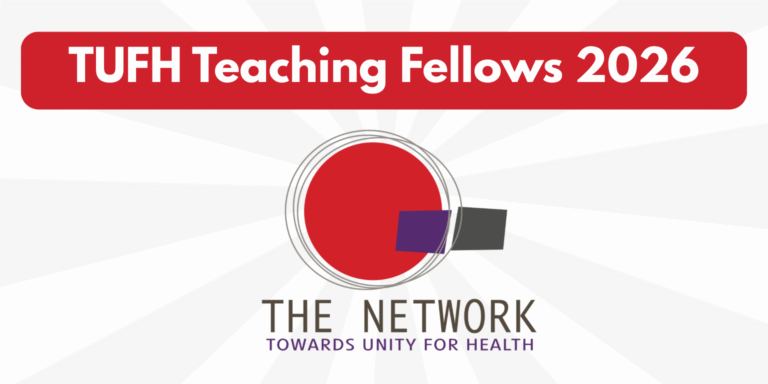
Aligning Education with Social Accountability
To assist regional educators to host their own version of the Health Workforce for the Public Good program, we are offering six 2-hour live sessions once a week followed by several months of individual or team mentoring. Institutions starting their own courses will have full access to the PPTs, lesson plans, readings, and discussion questions we have used in previous years. We are calling this the HWEPG 2026 Teaching Fellowship and applications are closing soon.
Overview: TUFH is investing in the capacity of regions and countries through its Centers of Excellence program to achieve its vision for local adoption and implementation on Social Accountability, Interprofessional Education and Collaborative Care, and Health Workers Competency Standards.
This TUFH Teaching Fellowship is part of that strategy. The purpose of the Teaching Fellowship is to work in partnership with education leaders so they can adapt the current online Health Workforce for the Public Good (HWEPG) course and implement it in their region. Applicants nominated by a TUFH Center of Excellence will receive priority although we welcome other applicants who are connected to institutions advocating social accountability in their region.
We anticipate that participants will have curriculum design and teaching skills to share with others in the program. Materials from the current HWEPG course will be freely available to participants to modify or use intact. HWEPG course values – participants learn from and with each other, a focus on application of knowledge, and emphasis on local authenticity of content – are maintained, while the program is adapted by participants to meet local needs.
Applicants will be asked to include a plan for adapting and implementing the HWEPG program in their region. Fellows will present their preliminary plans during the last live session. After the last live session, individual and group mentoring will be available to help complete planning and implementation of the local HWEPG program.
TUFH Teaching Fellowship Objectives:
By the end of this Fellowship, participants will be able to …
- Create a plan and gather a team for developing and implementing a customized course
- Write clear, measurable objectives for their program and define modules to achieve them.
- Update the tufh.org platform with readings, objectives, discussions relevant to their setting (or develop an alternative platform)
- Conduct a live online session that creates a supportive environment, engages participants, and encourages learning from each other
- Support faculty to develop or use the levers of change in education, e.g., accreditation, program evaluation, leadership, research
- Help faculty develop and implement local projects that promote alignment with community needs
The Current HWEPG Program:
In the current HWEPG program, four courses are offered in sequence. In the first course, Social Accountability, we encourage participants to think about problems, needs, or opportunities in their environment, grounding those initial thoughts in empiric data about their community, and in existing research on relevant issues. In Appreciative Inquiry and Resilience, they will use the 4D model of appreciative inquiry to imagine an innovation to address this problem and its pathway to implementation. The following course, Interprofessional Education, asks them to consider the stakeholders, including the community, who will have input into their thinking about the pressing local problems or opportunities. Finally, in Transformative Leadership, participants will develop an “outcomes chain,” also called a “theory of change,” for a local innovation project which will lead to a process for evaluation. The adapted regional programs may contain all four courses or fewer if deemed appropriate.
Current HWEPG Objectives:
- Apply leadership skills to develop, implement, and evaluate innovations that enhance institutional commitment to community health.
- Work with teams at their institutions and across institutions to promote social accountability.
- Use the ISAT instrument to organize an institutional self-assessment of progress toward social accountability.
- Collaborate with community leaders to educate the health workforce.
- Co-develop research with the community that benefits community health.
- Work with rural and remote communities to enhance health through workforce development.
- Align education with health systems and health practice to strengthen teamwork and collaborative care.
- Develop, apply, and monitor institutional accreditation standards for community integration in decision-making.
These may be refined as participants develop ideas for their local program.
Participants
TUFH Teaching Fellows are a diverse, transnational network of leaders, activists, innovators, thinkers, and doers within health workforce entities. We recognize the educational expertise of participants and envision this program as an opportunity to share ideas. We anticipate welcoming up to 20 Senior Fellows.
Logistics:
- Six weekly 2 hour online sessions with readings and discussion on tufh.org on
Mondays from 2 – 4 PM UTC - Modules include:
- Mechanics, and resources of the current program: readings, forum, presentations, faculty guides
- The public good – how do we know what it is, how do we continuously align education with it
- Tools of change – appreciative inquiry, leadership
- Tools for working together – connection with community, teamwork across sectors
- Project development, implementation, and evaluation
- Capstone presentations: customized faculty development program and evaluation plan
Timing:
- January 16, 2026: Applications Close
- January 31, 2026: Fellow Selection
- March 2 – April 6, 2026: Fellowship Program (six weekly 2 hour sessions ending with Capstone Presentations)
- June 1, 2026: Group Mentoring on Regional Initiatives (Individual available upon request)
Application Requirements:
- Describe your career goals and how the Teaching Fellow will help advance them (50 word max)
- Your HWEPG project (100 word max for each question):
- What will be the purpose of your local HWEPG program?
- What is your strategy for gathering support for the new program?
- What are the available human resources to support the new program?
- What challenges to developing the new program do you anticipate?
- What is the anticipated timeline for development and implementation?
- An Institutional Support Letter indicating their support and institutional commitment to developing and implementing a local HWEPG project.
- CV
Cost:
Free for TUFH members.
50% of the individual membership fee for non-members.
https://thenetworktufh.org/membership/
Applicants from existing TUFH Centers of Excellence or from the countries listed below will receive preference in the selection process.
EXISTING TUFH CENTERS OF EXCELLENCE
1. North America: Canada 
2. Latin America: Mexico 


3. EMRO: Egypt 




4. Africa: Nigeria 


5. SE Asia: India 


6. Western Pacific: Philippines 

PRIORITIZED TUFH CENTERS OF EXCELLENCE
1. Latin America (Colombia 



2. EMRO (Pakistan 

3. Europe (United Kingdom 
4. Western Pacific (Japan 


5. SE Asia (China 



6. Africa (Algeria 





If you have any questions please secretariat@thenetworktufh.org




